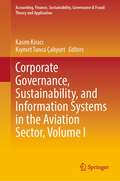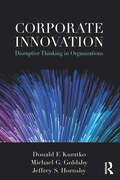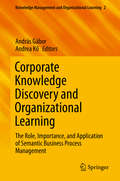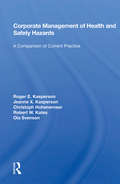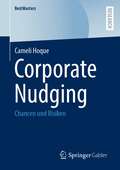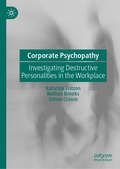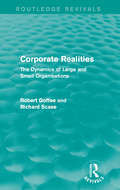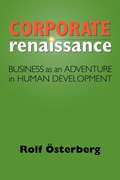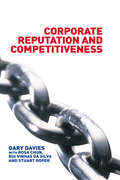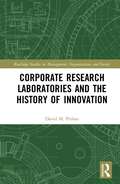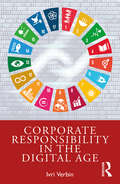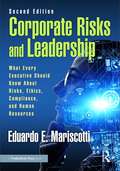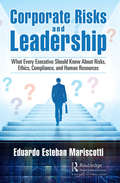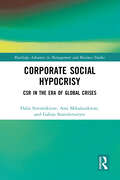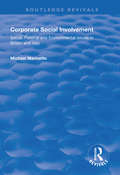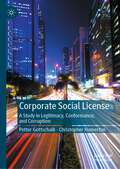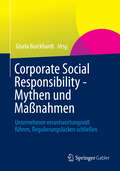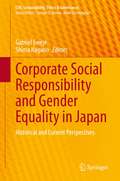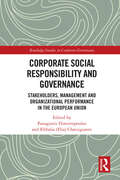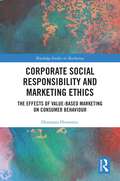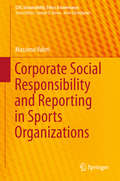- Table View
- List View
Corporate Governance, Sustainability, and Information Systems in the Aviation Sector, Volume I (Accounting, Finance, Sustainability, Governance & Fraud: Theory and Application)
by Kıymet Tunca Çalıyurt Kasım KiracıThis book delves into corporate governance, sustainability, and information systems related to the aviation sector. Due to globalization and rise in cross-border business, the aviation sector has become an essential means of transport. However, the industry has tremendous impact on social, economic, and natural environments and carries significant risks. The book explores such issues plaguing the aviation sector under three key areas: CSR and sustainability, information systems and risk management, and corporate governance and accountability in the airline industry. The book concludes with an analysis of the impact of COVID-19 crisis on the industry and ways to respond and recover from the effects of the pandemic.
Corporate Innovation: Disruptive Thinking in Organizations
by Donald F. Kuratko Jeffrey S. Hornsby Michael G. GoldsbyEffectiveness is the underlying theme for this introduction to disruptive innovation. The book tells the manager, or student, what they need to know in transforming the thinking in an organization to an innovative mindset in the twenty-first century.Corporate Innovation explains the four stages of the innovation process, and demonstrates how to improve skills in the innovation process, and unleash personal innovative abilities. This book also presents ways to assess the organization’s attitudes toward innovation, providing insights into how to diagnose creative and innovative performance problems in the organization. Beginning with an overview of concepts involved with an innovative organization today, this book explores the fundamental aspects of the individual, the organization and the implementation. An I-Organization is a combination of: I-Skills developed within individuals I-Design thinking functions needed to shape innovation I-Teams that emerge from the HR perspective of structuring the appropriate climate I-Solution needed to provide a foundation for implementing any innovative ideas Essential reading for students of corporate innovation, corporate ventures, corporate strategy, or human resources, this book also speaks to the specific needs of active managers charged with the expectation of enhancing the innovative prowess of their organization.Instructors’ outlines, lecture slides, and a test bank round out the ancillary online resources for this title.
Corporate Islam
by Patricia Sloane-WhiteCompelling and original, this book offers a unique insight into the modern Islamic corporation, revealing how power, relationships, individual identities, gender roles, and practices - and often massive financial resources - are mobilized on behalf of Islam. Focusing on Muslims in Malaysia, Patricia Sloane-White argues that sharia principles in the region's Islamic economy produce a version of Islam that is increasingly conservative, financially and fiscally powerful, and committed to social control over Muslim and non-Muslim public and private lives. Packed with fascinating details, the book is essential reading for anyone with an interest in Islamic politics and culture in modern life.
Corporate Knowledge Discovery and Organizational Learning: The Role, Importance, and Application of Semantic Business Process Management (Knowledge Management and Organizational Learning #2)
by András Gábor Andrea KőThis book investigates organizational learning from a variety ofinformation processing perspectives. Continuous change and complexity inregulatory, social and economic environments are increasingly forcingorganizations and their employees to acquire the necessary job-specificknowledge at the right time and in the right format. Though many regulatorydocuments are now available in digital form, their complexity and diversitymake identifying the relevant elements for a particular context a challenging task. In such scenarios, business processes tend to be important sources ofknowledge, containing rich but in many cases embedded, hidden knowledge. This book discusses the possible connection between businessprocess models and corporate knowledge assets; knowledge extraction approachesbased on organizational processes; developing and maintaining corporateknowledge bases; and semantic business process management and its relation toorganizational learning approaches. The individual chapters reveal the differentelements of a knowledge management solution designed to extract, organize andpreserve the knowledge embedded in business processes so as to: enrichorganizational knowledge bases in a systematic and controlled way, supportemployees in acquiring job role-specific knowledge, promote organizationallearning, and steer human capital investment. All of these topics are analyzedon the basis of real-world cases from the domains of insurance, food safety,innovation, and funding.
Corporate Management Of Health And Safety Hazards: A Comparison Of Current Practice
by Roger E. KaspersonThis book provides one of the first systematic accounts of how corporations manage risk to workers and consumers. Careful analysis and interviewing in different corporations elicit a portrait of the myriad hazards that currently confront industry, the corporate programs and resources that have emerged since 1970 to respond to this challenge, and factors that have contributed to successes and failures. In-depth studies of the Volvo Car Corporation, Rocky Flats nuclear weapons plant, Union Carbide's Bhopal facility, and large chemical and pharmaceutical corporations provide a state-of-the-art assessment of the advances and problems inherent today in industrial safety management. Roger E. Kasperson, Jeanne X. Kasperson, and Christoph Hohenemser are senior researchers at Clark University's Center for Technology, Environment, and Development (CENTED). Roger E. Kasperson is Director of CENTED and its Hazard Assessment Group. Jeanne X. Kasperson is Research Librarian at CENTED and Senior Research Associate in Brown University's World Hunger Program. Hohenemser, a professor of physics, directs the Environment, Technology, and Society Program at Clark University. Robert W. Kates, formerly with CENTED, is Director of the Alan Shawn Feinstein World Hunger Program at Brown University. Ola Svenson, of the Department of Psychology at Lund University in Sweden, is a leading researcher in the field of risk perception and decision analysis.
Corporate Nudging: Chancen und Risiken (BestMasters)
by Cameli HoqueDieses Buch widmet sich der Frage, wie private Unternehmen die Erkenntnisse der Verhaltensökonomie nutzen und Nudges erfolgreich in der Praxis einsetzen können. Die Untersuchung zeigt, dass Nudges sowohl im Mitarbeitermanagement als auch bei der Beeinflussung des Verbraucherverhaltens eine große Palette an vielversprechenden Anwendungsmöglichkeiten bieten. Die Arbeit betont jedoch auch potenzielle ethische Risiken und unerwünschte Auswirkungen und liefert umfangreiche Erkenntnisse über effektive Nudge-Techniken, ethische Überlegungen und Handlungsempfehlungen für Unternehmen.
Corporate Psychopathy: Investigating Destructive Personalities in the Workplace
by Katarina Fritzon Nathan Brooks Simon CroomThis book analyses the conceptualization of psychopathic personality disorder for criminal/forensic populations and examines in depth the emerging phenomenon of the ‘corporate psychopath’. In doing so its authors expose the paradoxical nature of the disorder: while it is frequently associated with antisocial, criminal and predatory behaviour, more recent studies have highlighted examples of creative, visionary and inspiring leaders who are also found to present a high degree of psychopathy. They focus on the nature, behaviours and consequences of psychopathy in executives and across the organization, offering an important contribution to the emerging body of research on psychopathy and other problematic personality constructs in the workplace. The book will appeal to scholars, students and professionals across the discipline, and particularly to those working in workplace, forensic and personality psychology.
Corporate Realities: The Dynamics of Large and Small Organisations (Routledge Revivals)
by Robert Goffee Richard ScaseCorporate Realities, first published in 1995, provides a concise but comprehensive review of the management issues relating to different types of organisation. Avoiding academic jargon, it describes the characteristics of administrative, manufacturing, service and professional organisations. It explores the features of both small and large businesses. The authors demonstrate how the transition from small to large scale can be achieved, as well as reviewing recent attempts to recreate entrepreneurial forms of organisation in the context of larger, more complex ones. Most importantly, it identifies future trends and the skills that will be needed to manage corporations at the turn of the century. This book will be of interest to students of business studies.
Corporate Renaissance: Business as an Adventure in Human Development
by Rolf OsterbergIn this radical book on business and work, Swedish businessman Rolf Osterberg argues that businesses have their priorities all wrong. Paradoxically, corporations also--more than any other institution--have the potential to act as an agent of change toward a human-oriented world. The solution lies in the ongoing fundamental shift in our way of thinking--of our perception of the world, life, the human being, and meaning. This is Osterberg's "new thought." In Corporate Renaissance, Osterberg explores: How the creativity of its employees--not capital--is a company's greatest asset; Why employee-owned companies are the model for the future; Why hierarchies prevent problem-solving; How profit-taking can doom a company; Why setting goals, without an underlying vision, is destructive.
Corporate Reputation and Competitiveness
by Stuart Roper Rosa Chun Rui Da Silva Gary DaviesThis unique book written by four world leaders in reputation research, presents the latest cutting-edge thinking on organizational improvement. It covers media management, crisis management, the use of logos and other aspects of corporate identity, and argues the case for reputation management as a way of overseeing long-term organizational strategy. It presents a new approach to managing reputation, one that relies on surveying customers and employees on their view of the corporate character and in harmonizing the values of both. This approach has been trialled in a number of organizations and here the authors demonstrate how improving reputation, merely by learning more about what a company is already doing, is worth some five per cent sales growth. The book is a vital, up to date resource for specialists in corporate communication, public relations, marketing, HRM, and business strategy as well as for all senior management. Highly illustrated with over eighty diagrams and tables, it includes up to the minute illustrative case studies and interviews with leading authorities in the field.
Corporate Research Laboratories and the History of Innovation (Routledge Studies in Management, Organizations and Society)
by David M. PithanWith the beginning of the twentieth century, American corporations in the chemical and electrical industries began establishing industrial research laboratories. Some went on to become world-famous not only for their scientific and technological breakthroughs but also for the new union of science and industry they represented. Innovative ideas do not simply appear out of the blue and spread on their own merit. Rather, the laboratory's diffusion takes place in a cultural context that goes beyond corporate capital and technological change. Using discourse analysis as a method to comprehensively capture the organizational field of the early American R&D laboratories from 1870 to 1930, this book uncovers the collective meanings associated with the industrial laboratory. Meanings such as what and where a laboratory is supposed to be, who the scientist is, and what it means to practice science provided cultural resources that made the transfer of the laboratory from academic science into an industrial setting possible by rendering such meanings understandable and operable to big business and organizational entrepreneurs fighting for hegemony in a rapidly evolving market. It analyzes not only the corporations that established laboratories in the United States but also their contexts – economic, political, and especially scientific – showing how "the industrial laboratory" was transformed from an organizational novelty into an expected institution in less than two decades. This book will be of interest to researchers, academics, historians, and students in the fields of organizational change, discourse studies, the management of technology and innovation, as well as business and management history.
Corporate Responsibility in the Digital Age: A Practitioner’s Roadmap for Corporate Responsibility in the Digital Age
by Ivri VerbinThis book is a roadmap to help organizations adopt corporate responsibility and sustainability practices and be fit for purpose in a digital era. It explains why corporate responsibility is the only option in the twenty-first-century post-COVID-19 world, and guides readers through the process of transforming their organizations with continued reference to the importance of technology. This is not a technical manual, and it is not an academic textbook: it is designed to be a quick, easily digested read. The first part looks at the current landscape – both of business and of the world in which it operates. The second part explains why corporate responsibility is the only realistic option for business in the twenty-first-century, post-COVID, and who needs to take responsibility for it. The third part is a step-by-step guide to putting principles into practice, covering: values, stakeholder engagement, employees, supply chain, environment, community, customers and marketing, and reporting and transparency. Each chapter is linked to relevant UN Sustainable Development Goals and supported by dozens of real-world examples. By the end of the book, business leaders will have understood the scope of the challenge involved in leading a truly socially and environmentally responsible organization, and, crucially, will have understood why such a course of action is not only desirable but essential. And they will also have been inspired by a sense of purpose. The book offers direct access to the processes, insights, and techniques for installing corporate responsibility throughout organizations large and small, based on the author’s many years’ experience working in government and with successful large corporations. It is up-to-date and relevant, addressing the implications of COVID-19 and the modern technological “Fourth Industrial Revolution.”
Corporate Risks and Leadership: What Every Executive Should Know About Risks, Ethics, Compliance, and Human Resources
by Eduardo E. MariscottiThe context of business has been changing for companies in recent years, and following numerous corporate and accounting scandals, many countries have increased the number of national and international regulations designed to ensure transparency and compliance with the law. Because of the existence of these new regulations, the level of control, the severity of sanctions by governments, and the amount of fines for noncompliance have increased dramatically.In parallel, with the technological revolution in communications, business management has become more transparent, and any negative event is uploaded to social networks and shared with an indeterminate number of people. This change in the regulatory, sanctioning, and technological context has forced large companies to rethink risks, investments, and budgets to deal with this more complex environment.To transition to this change, some companies have included ethics and compliance programs in their corporate agenda, along with marketing and sales plans, strategies, growth targets, investment plans, and/or talent acquisition. While each industry has its particular risks, in this book, the author describes the essential elements that any effective ethics and compliance program should contain.This book is a source of information that connects yesterday with today. The author shares observations and lessons of the past to suggest corporate leaders implement effective ethics and compliance programs to protect their organizations and themselves. This book covers theories of ethics but with an eye focused on practical application. Risks, ethics, and compliance are analyzed with an overall vision, connected to the reality of business life, without getting bogged down in abstract thinking or technical and regulatory details.Ethics and compliance are disciplines that have increasingly achieved greater recognition in organizations. Thus, due to the importance of risk management in the business world and the necessary involvement of the CEO and the board of directors, it seems appropriate that executives get access to this book about risks, ethics, compliance, and human resources directed not only to compliance experts but also to any organizational leader.This second edition offers various examples to cultivate ethical thinking and behavior, identify common risks, and comprehend their adverse effects on organizations.
Corporate Risks and Leadership: What Every Executive Should Know About Risks, Ethics, Compliance, and Human Resources
by Eduardo Esteban MariscottiThe context of business has been changing for companies in recent years, and following numerous corporate and accounting scandals, many countries have increased the number of national and international regulations designed to ensure transparency and compliance with the law. Because of the existence of these new regulations, the level of control, the severity of sanctions by governments, and the amount of the fines for noncompliance have increased dramatically. In parallel, with the technological revolution in communications, business management has become more transparent, and any negative event is uploaded to social networks and shared with an indeterminate number of people. This change in the regulatory, sanctioning and technological context has forced large companies to rethink risks, investments and budgets to deal in this more complex environment. To transition to this change, some companies have included ethics and compliance programs in their corporate agenda, along with marketing and sales plans, strategies, growth targets, investment plans and/or talent acquisition. While each industry has its particular risks, in this book, the author describes the essential elements that any effective ethics and compliance program should contain. This book is a source of information that connects yesterday with today. The author shares observations and lessons of the past to suggest corporate leaders implement effective ethics and compliance programs to protect their organizations and themselves. The book covers theories of ethics but with an eye focused on practical application. Risks, ethics, and compliance are analyzed with an overall vision, connected to the reality of business life, without getting bogged down in abstract thinking or in technical and regulatory details. Ethics and compliance are disciplines that have increasingly achieved greater recognition in organizations. Thus, due to the importance of risk management in the business world and the necessary involvement of the CEO and the board of directors, it seems appropriate that executives get access to a book about risks, ethics, compliance and human resources directed not only to compliance experts but also to any organizational leader. This book is a wake-up call that allows business leaders to understand the benefits of implementing an effective ethics and compliance program that will help members of organizations to make the right decisions and act within the law. If they do, they can better prevent and react to the difficult obstacle course of risks, dangers and threats that organizations face and that may jeopardize the sustainability, resilience, and survival of companies.
Corporate Sector Restructuring
by Mark R. StoneExamines the steps involved in restructuring the corporate sector. Large-scale corporate restructuring made necessary by a financial crisis is one of the most daunting challenges faced by economic policymakers. The government is forced to take a leading role, even if indirectly, because of the need to prioritize policy goals, address market failures, reform the legal and tax systems, and deal with the resistance of powerful interest groups.
Corporate Social Entrepreneurship
by Christine A. HemingwayBusiness ethics teaching appears to have had little impact, particularly in the light of continued malpractice and misdemeanour in the form of financial scandals, environmental disasters and adverse consequences for communities. This timely book directly addresses a central question: is it that the existence of an ethical or an unethical climate influences behaviour, or, does the presence or absence of a moral character and personal values have the greatest influence on behaviour at work? Drawing on an empirically derived study and over thirty years of experience in both the public and private sectors, Hemingway proposes four modes of individual moral commitment to corporate social responsibility (CSR) and sustainability: the Active Corporate Social Entrepreneur, the Concealed Corporate Social Entrepreneur, the Conformist and the Disassociated. The discovery of the corporate social entrepreneur offers students and scholars a critical, alternative and optimistic perspective for the future of ethical business.
Corporate Social Hypocrisy: CSR in the Era of Global Crises (Routledge Advances in Management and Business Studies)
by Asta Mikalauskienė Dalia Steimikiene Gabija StanislovaitytėMany new challenges including competitiveness are emerging for sustainable business during this era of disruption. This book analyses these challenges to sustainable development and growth and addresses the impact of corporate social responsibility on the competitiveness of organisations. The authors analyze the major challenges for competitiveness of sustainable business in the COVID-19 era, taking into account a new business environment amid major global risks and uncertainties linked to climate change, pandemics, Russian-Ukrainian war, and intuitions of forthcoming new world economic crisis. The monograph consists of five parts: 1) sustainable development goals and the role of business; 2) climate change, COVID-19, fragile political situation, and business; 3) corporate social responsibility and corporate social hypocrisy; 4) corporate social responsibility, corporate social hypocrisy, and competitiveness of business; and 5) case study on the impact of corporate social responsibility on competitiveness with the impediments of corporate social hypocrisy. The book presents new insights in assessing the impact of CSR on competitiveness of companies with the impediments of corporate social hypocrisy. The developed framework and case study allows to develop valuable policy and managerial implications for sustainable business and engagements in corporate social responsibility as well as to show the danger of corporate social hypocrisy for competitiveness. This book will be of value to researchers, academics, and students in the fields of corporate social responsibility, organizational management, business ethics, and responsible business.
Corporate Social Involvement: Social, Political and Environmental Issues in Britain and Italy (Routledge Revivals)
by Michael MarinettoFirst published in 1998. This is an examination of corporate social responsibility in Britain and Italy. There is a growing interest in businesses rendering themselves more socially active and becoming more involved in addressing social problems. A number of British companies have been adopting many of the community practices that have characterized corporate life in America since the early 1960s. Corporate responsibility is defined as a business engagement in the wider community in order to contribute towards the general well-being of society. This study employs a hybrid methodology using a variety of sources including historical texts, secondary studies and detailed case studies of corporate social programmes. Businesses studied include Shell, BT, Unilever, and BAT Industries in Britain, and Fiat, Olivetti, ENI, IRI and Dioguardi in Italy. The study aims to provide a qualitative explanation of why companies go beyond their commercial remit to become engaged in communitarian and philanthropic action. Ultimately, the book aims to present a socially and politically informed analysis placed in its historical and political context, taking into consideration economic forces.
Corporate Social License: A Study in Legitimacy, Conformance, and Corruption
by Petter Gottschalk Christopher HamertonThis book makes a distinctive and innovative contribution to the study of white-collar and corporate crime through detailed examination of the use, affect, and violation of the corporate social license – a concept frequently extended to a license to operate. Whilst discrete aspects of corporate social responsibility have found their way into the discourse on business deviance and crime, no single book to date has provided a detailed exploration of social licence through a criminological lens. Here, using an interdisciplinary focus which includes illustrative case-studies and large-scale original fieldwork, Gottschalk and Hamerton explore European, North American, Asian, and global perspectives to identify, position, and reveal the impact of the social license on contemporary conceptions of white-collar and corporate deviance and crime. Corporate Social License: A Study in Legitimacy, Conformance, and Corruption will be of interest to scholars of criminology, law, business management, and sociology along with professionals within allied fields.
Corporate Social Responsibility - Mythen und Maßnahmen: Unternehmen verantwortungsvoll führen, Regulierungslücken schließen
by Gisela BurckhardtIn Zeiten der Globalisierung und Massenproduktion rückt verantwortungsvolle Unternehmensführung immer mehr in das Bewusstsein der Unternehmen. Damit Corporate Social Responsibility in Organisationen nicht als reine PR-Maßnahme angesehen wird, braucht es jedoch zunächst ein tiefes Verständnis, was sich hinter dem Begriff eigentlich verbirgt. Dieses Buch zeigt die Bandbreite von Unternehmensverantwortung zwischen Freiwilligkeit und Regulierung in globalen Lieferketten auf. Es stellt Maßnahmen und Initiativen von Unternehmen vor und gibt konkrete Empfehlungen, wie sinnvolle und nachhaltige CSR-Maßnahmen in Organisationen umgesetzt werden können.
Corporate Social Responsibility and Gender Equality in Japan: Historical and Current Perspectives (CSR, Sustainability, Ethics & Governance)
by Gabriel Eweje Shima NaganoThis book examines key issues in gender equality and corporate social responsibility in Japan. Legal compliance, the business case and social regulation are examined as driving factors for enhancing gender equality in corporations. In turn, case studies from various contexts, such as the hotel industry, retail and financial services companies add practical insights to the theoretical debate. The role of governments, NGOs and supranational organizations is examined as well. Given its scope, the book will appeal to undergraduate and graduate students, scholars, policymakers and practitioners interested in advancing the gender, CSR and sustainability debates.
Corporate Social Responsibility and Governance: Stakeholders, Management and Organizational Performance in the European Union (Routledge Studies in Corporate Governance)
by Panagiotis Dimitropoulos Efthalia Elia ChatzigianniCorporate social responsibility (CSR) has developed into a crucial corporate and organizational issue around the world. It has been incorporated into various sectors and countries, and includes many types of activities and dimensions. It is a common notion that organizations are more inclined today to broaden and shift their performance focus from short-term goals towards long-term social, environmental, and value-added perspectives. Under the framework of corporate governance, organizations and companies are motivated to promote fairness, transparency, ethics, and accountability in their transactions, while concurrently maintaining enhanced standards of governance. This means that organizations and corporations must align their activities with community aspirations which is an issue falling within the sphere of CSR. Increased attention has been placed on the organizations regarding their approach towards the needs of various stakeholders. However, a crucial issue that this book attempts to address is the association, intersection, and inter-relationship between governance and CSR within the EU region, which are not adequately established in the existing literature. The book will show that governance and CSR are highly connected. With the purpose of studying the association of CSR with legal, managerial and empirical aspects of governance in corporations and not-for-profit organizations, in various sectors of the economy, the book also intends to provide useful policy implications, as well as to offer constructive directions for future research. This book will be of value to researchers, academics, practitioners, policymakers, and students in the fields of CRS and governance, organizational theory, marketing management, business ethics and human resource management.
Corporate Social Responsibility and Governance: Stakeholders, Management and Organizational Performance in the European Union (Routledge Studies in Corporate Governance)
by Panagiotis Dimitropoulos Efthalia Elia ChatzigianniCorporate social responsibility (CSR) has developed into a crucial corporate and organizational issue around the world. It has been incorporated into various sectors and countries, and includes many types of activities and dimensions. It is a common notion that organizations are more inclined today to broaden and shift their performance focus from short-term goals towards long-term social, environmental, and value-added perspectives.Under the framework of corporate governance, organizations and companies are motivated to promote fairness, transparency, ethics, and accountability in their transactions, while concurrently maintaining enhanced standards of governance. This means that organizations and corporations must align their activities with community aspirations which is an issue falling within the sphere of CSR. Increased attention has been placed on the organizations regarding their approach towards the needs of various stakeholders. However, a crucial issue that this book attempts to address is the association, intersection, and inter-relationship between governance and CSR within the EU region, which are not adequately established in the existing literature. The book will show that governance and CSR are highly connected. With the purpose of studying the association of CSR with legal, managerial and empirical aspects of governance in corporations and not-for-profit organizations, in various sectors of the economy, the book also intends to provide useful policy implications, as well as to offer constructive directions for future research. This book will be of value to researchers, academics, practitioners, policymakers, and students in the fields of CRS and governance, organizational theory, marketing management, business ethics and human resource management.
Corporate Social Responsibility and Marketing Ethics: The Effects of Value-Based Marketing on Consumer Behaviour (Routledge Studies in Marketing)
by Honorata HowaniecChanges in the economy and greater competition force us to adapt our business practices and to take greater account of the needs of consumers and the social problems they care about. Consumers are placing an increasing weight on the social responsibility of the organisations they choose to purchase from and associate with, and businesses must adopt corporate social responsibility (CSR) practices into their marketing strategies. This book demonstrates the concept of CSR and how it is included as an element of value-based marketing. Using research from the Polish market, the author explores the concept of value-based marketing, how organisations are implementing CSR, and analyses the effect on consumer behaviour. It examines consumer awareness of CSR practices and the effect this has on their purchasing decisions and brand loyalty, making the argument that disregarding CSR can be detrimental to businesses success and profit. Providing both empirical and theoretical perspectives, this book will be a useful reference for scholars and upper-level students across business disciplines including marketing, CSR, and business ethics.
Corporate Social Responsibility and Reporting in Sports Organizations (CSR, Sustainability, Ethics & Governance)
by Massimo ValeriThis book explores the key issues of corporate social responsibility (CSR) and reporting as applied to sports organizations, with particular attention to the Italian environment. It is divided into two parts, the first of which examines the general principles and reporting tools of CSR; these represent the reference point for all types of organization, including sports organizations. The coverage encompasses the evolution of CSR and the latest standards issued by authoritative international public and private institutions. The aim is to provide readers with a sound basis for understanding fully the application of these principles and reporting tools within the world of sport. The second part is devoted to a detailed analysis of the CSR strategies and social reporting initiatives adopted by sports organizations. Although the focus is primarily on Italian sports organizations, due attention is also paid to world benchmarks. In particular, the analysis examines the CSR strategies and reporting initiatives developed by international and Italian sports federations and by two international professional football clubs. The book will be of wide interest to academics, students, and practitioners.
